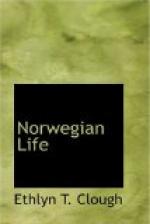CHAPTER II
NORWAY IN THE NINETEENTH CENTURY
As early as 1790 negotiations took place between Count Armfeldt on behalf of Gustavus III of Sweden and various patriotic and influential Norwegians with a view to effecting a union between Norway and Sweden on equal terms, but the Norwegian negotiators expressed themselves unwilling to accept for Norway the government prevailing in Sweden. A minority of the patriots thought that the Danish yoke could only be broken by means of a union with Sweden, while a majority aimed at nothing less than absolute independence at any cost.
Such was the condition of Norway when by the treaty of Kiel (Jan. 14, 1814) the allies compelled the king of Denmark to cede Norway to Sweden and made Charles John Bernadotte crown prince of Sweden and Norway. The Norwegians denied the right of Denmark to Norway, refused to recognize the treaty of Kiel as having any binding force on them, as they were not parties to it, and invited Prince Christian Frederick of Denmark to accept the Norwegian throne from its people and to govern pursuant to a constitution adopted at Eidsvold, May 17, 1814. Among the provisions of this instrument are the following: That Norway should be a limited hereditary monarchy, independent and indivisible, whose ruler should be called a king; that all legislative power should reside in and be exercised by the people through their representatives; that all taxes should be levied by the legislative authority; that the legislative and judicial authority should be distinct departments; that the right of free press should be maintained; that no personal or hereditary distinction shall hereafter be granted to any one.
The election of a king and adoption of an independent constitution in disregard of the treaty of Kiel was tatamount to a declaration of war against Sweden, and as such it was taken. After the treaty of Paris and the abdication of Napoleon, the powers agreed to force Norway to accept the treaty of Kiel, and representatives of the allied powers came to Norway and demanded its compliance on penalty of war with the allies. The Norwegians remained obdurate. The Swedes, under Bernadotte, marched across the frontier and took the fortress Fredricksteen. Another division of the Swedish army was beaten by the Norwegians and driven back over the frontier. Several other




